Black beans are a nutritious and versatile addition to any diet. These legumes are packed with essential nutrients that contribute to overall health and wellbeing. In this section, we will delve into the various health benefits of black beans and explore their nutritional composition.
Key Takeaways
- Black beans are a nutrient-packed superfood that offers a wide range of health benefits.
- Incorporating black beans into your diet can aid in weight management, promote heart health, support digestive health, manage diabetes, strengthen bones, boost energy levels, enhance the immune system, and nourish brain health.
- Black beans are rich in essential nutrients such as fiber, protein, iron, calcium, magnesium, and antioxidants.
A Nutritional Powerhouse
Black beans are a true nutritional powerhouse, providing a wealth of essential vitamins and minerals in each serving. These small-but-mighty legumes are a low-fat, low-calorie source of protein, making them an ideal food for individuals looking to incorporate more plant-based sources of protein into their diets.
One ½ cup serving of cooked black beans contains approximately:
Disclosure: When you buy through links on our site, we may earn an affiliate commission.
| Nutrient | Amount |
|---|---|
| Calories | 114 |
| Protein | 8 grams |
| Fat | 0.5 grams |
| Carbohydrates | 20 grams |
| Fiber | 8 grams |
| Vitamin B1 (Thiamin) | 15% of the Daily Value (DV) |
| Vitamin B6 | 10% of the DV |
| Folate | 64% of the DV |
| Manganese | 38% of the DV |
| Magnesium | 30% of the DV |
| Iron | 20% of the DV |
| Phosphorus | 20% of the DV |
| Potassium | 8% of the DV |
| Copper | 18% of the DV |
This impressive nutrient profile makes black beans a smart choice for individuals with dietary restrictions or health concerns. They are low in fat and calories, but high in fiber, protein, and essential vitamins and minerals.
Protein-Packed Superfood
If you’re looking to shed a few extra pounds, black beans might be the perfect addition to your diet. Not only are they loaded with essential nutrients, but they are also an excellent source of plant-based protein. Incorporating black beans into your meals can aid in weight loss and promote a healthy body composition.
One cup of black beans contains around 15 grams of protein, making it a great option for vegetarians and vegans looking to up their protein intake. Protein takes longer to digest than carbohydrates, which means that incorporating more protein into your diet can help you feel fuller for longer periods, which can result in consuming fewer calories overall.
The high fiber content in black beans can also help regulate digestion, which can prevent bloating and constipation, often associated with weight gain. Fiber fills you up and slows down the absorption of sugar into the bloodstream, which helps maintain stable blood sugar levels throughout the day.
Black beans are versatile and easy to prepare, making them a convenient food to add to your diet. You can add them to soups, stews, salads, or even make a black bean burger. They are also a great addition to any Mexican-inspired dish, like tacos or burritos.
Including black beans in your diet is a simple and effective way to support your weight loss goals and promote overall health and wellbeing.
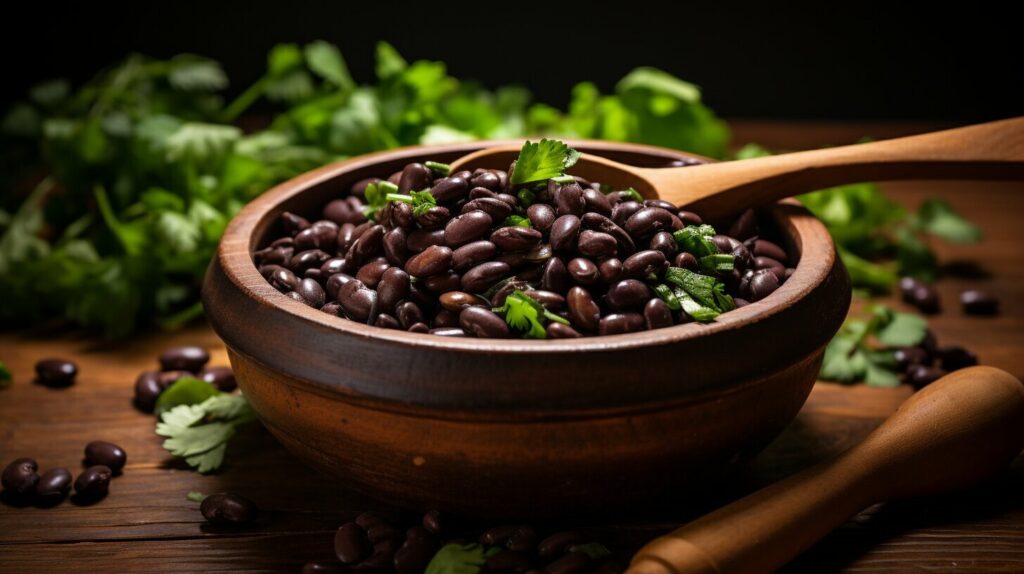
Heart-Healthy Benefits
Black beans are not only delicious but also heart-healthy. Consuming black beans as part of a balanced diet can reduce your risk of heart disease. This is because black beans contain cholesterol-lowering fibers, such as soluble and insoluble fibers.
These fibers work together to reduce harmful LDL cholesterol levels in your blood, reducing the risk of heart disease. Soluble fibers bind to bile acids, which are responsible for the absorption of fat. When your body excretes these bile acids, it needs to produce more, which requires the use of cholesterol. Insoluble fibers then help reduce the absorption of harmful cholesterol.
In addition to fiber, black beans also contain potassium, which can improve heart health. Potassium helps relax blood vessel walls, reducing blood pressure levels, and reducing the strain on your heart. This mineral also helps regulate your heartbeat, promoting a healthier heart.
Incorporating black beans into your diet can have a significant impact on your heart health. They are a versatile food that can be added to salads, soups, and stews, or enjoyed as a side dish.

Tip: Try swapping out meat in your meals with black beans as a plant-based protein source. This can help reduce your overall saturated fat intake and improve your heart health.
Promoting Digestive Health
Black beans are an excellent food choice for promoting digestive health. The high fiber content in black beans helps regulate bowel movements and maintain healthy digestion.
Consuming black beans can prevent constipation, a common digestive issue, and promote regularity. By keeping waste moving smoothly through your digestive system, black beans prevent the build-up of toxins in your body.
In addition to their high fiber content, black beans contain resistant starch, a type of carbohydrate that resists digestion. This type of starch helps feed the good bacteria in your gut, promoting a healthy balance of gut flora.
Including black beans in your diet can alleviate digestive issues such as bloating, gas, and cramping.
To incorporate black beans into your diet, try adding them to soups, salads, and stews, or using them as a base for vegetarian burgers and tacos.
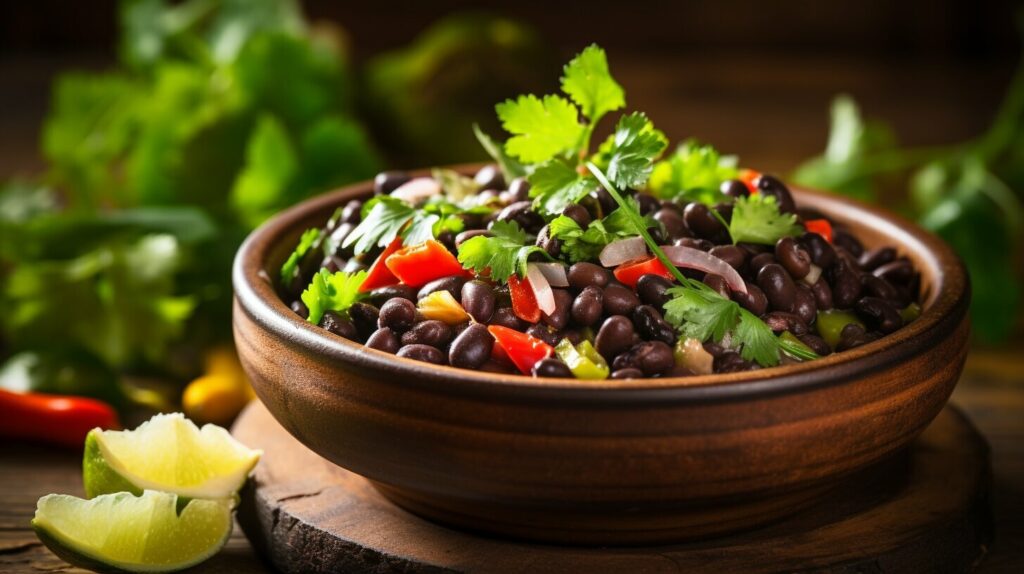
Digestive Health Tip:
Soak your black beans overnight before cooking to reduce their oligosaccharide content, which can cause digestive discomfort for some individuals.
Managing Diabetes with Black Beans
Black beans can be an excellent addition to a diabetes-friendly diet. With their low glycemic index, black beans can help regulate blood sugar levels and improve insulin sensitivity. Additionally, the high fiber content in black beans can slow down the absorption of carbohydrates, which can prevent blood sugar spikes after meals.
In fact, a study conducted on individuals with type 2 diabetes found that consuming black beans along with other high-fiber foods resulted in lower blood sugar levels compared to a low-fiber diet. Another study showed that eating black beans led to lower blood pressure levels in individuals with type 2 diabetes.
To incorporate black beans into your diet for diabetes management, try adding them to salads, soups, stews, or as a side dish. You can also use pureed black beans as a healthy and fibrous base for dips and spreads.
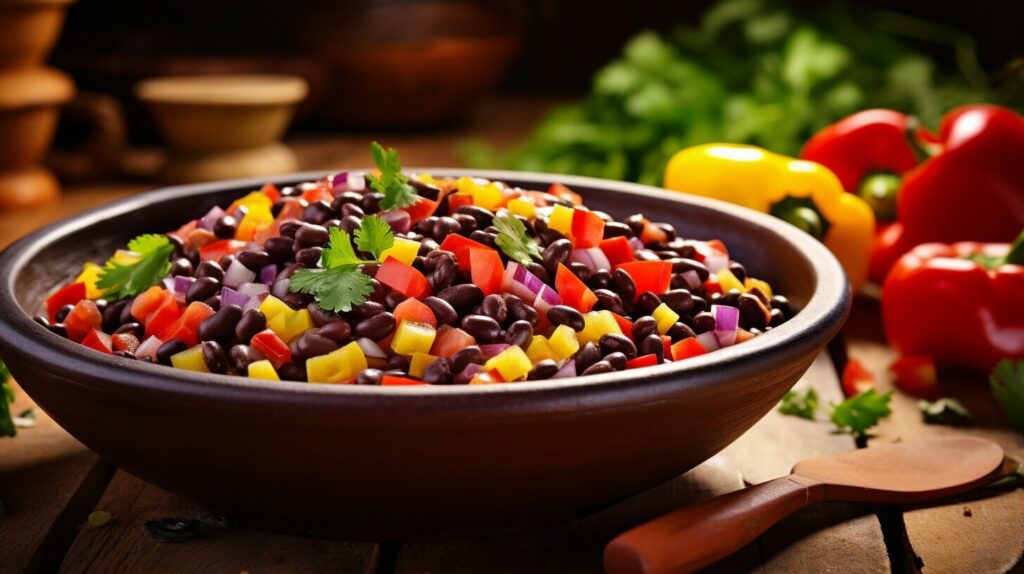
When cooking with black beans, avoid adding too much salt or sugar, as excess intake of these can lead to adverse health effects. Additionally, make sure to portion control, as black beans are high in carbohydrates. Aim for one-half to one cup of black beans per serving.
Overall, black beans can be a beneficial food for individuals with diabetes. They offer a nutritious source of carbohydrates, fiber, and protein, all of which can support blood sugar management and overall health.
Strengthening Bone Health
Black beans are a rich source of essential minerals like calcium, phosphorus, and magnesium, which play a vital role in strengthening bones and keeping them healthy. In fact, just one cup of cooked black beans provides about 23% of the daily recommended intake of magnesium, which is important for bone density and preventing bone loss.
Research has also linked the consumption of black beans to a reduced risk of osteoporosis, a condition characterized by weak and brittle bones that can lead to fractures and other complications. This is because black beans contain compounds that can help improve the absorption and utilization of calcium, a mineral critical for bone health.
Incorporating black beans into your diet can be a tasty and nutritious way to support your bone health. Try adding them to salads, soups, or as a side dish to your meals. You can also use them as a protein-rich substitute for meat in your favorite recipes to get the added benefit of their bone-boosting nutrients.

Boosting Energy Levels with Black Beans
Are you feeling fatigued and low on energy? Incorporating black beans into your diet can help boost your energy levels and keep you feeling sustained throughout the day. Black beans are a great source of complex carbohydrates, which provide a steady stream of energy. Additionally, they are also rich in iron, which is essential for oxygenating the body and preventing fatigue.
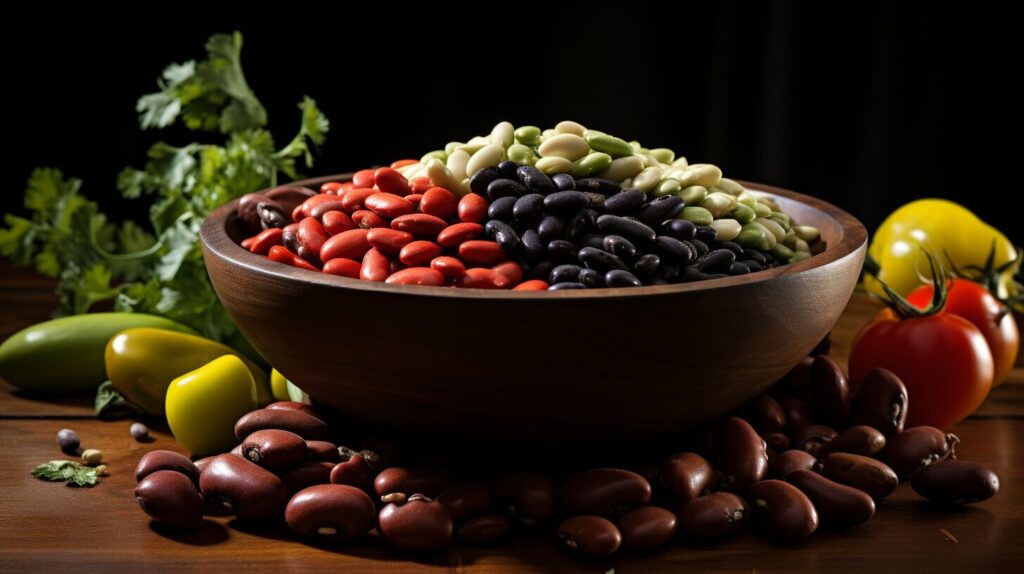
To reap the benefits of black beans for energy, try adding them to your meals in various ways. One popular option is to make a black bean salad with fresh vegetables and a light dressing. You can also use black beans as a protein source in vegetarian tacos or chili. Consider making a black bean dip for a healthy snack option.
Not only will adding black beans to your meals help sustain energy levels, but they will also provide a host of other health benefits. With their high nutritional value, black beans are a must-have addition to any healthy diet.
Enhancing the Immune System
Black beans can be a valuable addition to your diet for their immune-boosting properties. They contain antioxidants and phytonutrients that are known to support a healthy immune system and reduce the risk of infections and illnesses.
The high levels of zinc present in black beans can also help enhance immune function. Zinc plays a crucial role in the proper functioning of the immune system and can aid in the production of white blood cells that fight off harmful bacteria and viruses.
Incorporating black beans into your diet can provide a nutritious boost to your immune system. To get the maximum benefit, try incorporating them into meals like soups, stews, chili, or salads. You can also snack on roasted black beans or add them to dips like hummus for a healthy and flavorful snack.
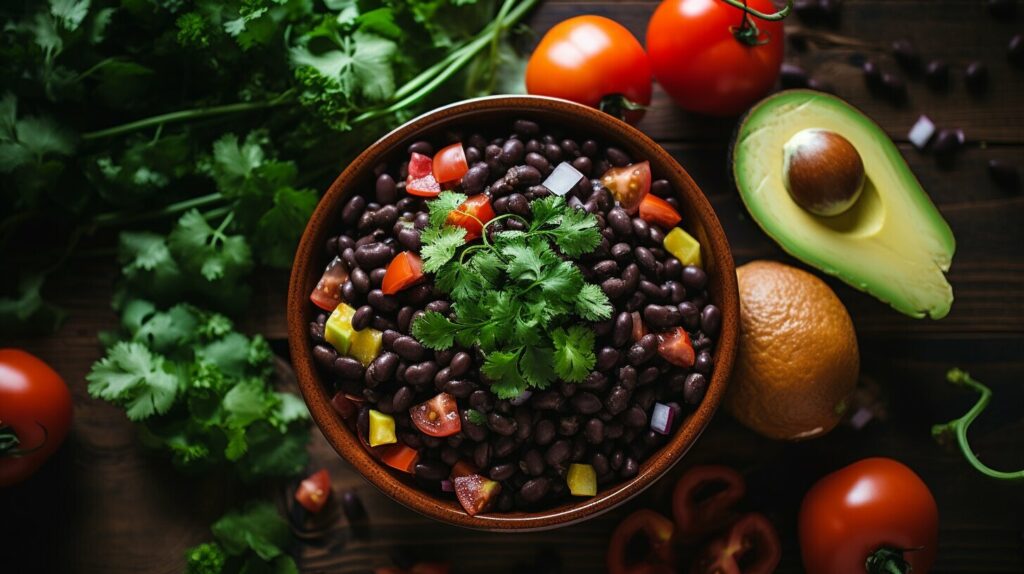
Keep in mind that while black beans can provide immune-boosting benefits, they are not a cure for illnesses or diseases. Always consult with your healthcare provider if you are experiencing any health issues or concerns.
Nourishing Brain Health
Black beans are not only a delicious addition to your diet, but they also offer a variety of health benefits, including promoting brain health. The essential nutrients found in black beans can support cognitive function and overall brain health.
One of the key nutrients found in black beans that supports brain health is folate. Folate plays an essential role in the production of neurotransmitters, which are vital for proper brain function. Inadequate folate levels have been linked to cognitive decline and neurological disorders such as Alzheimer’s disease.
Additionally, black beans are rich in antioxidants that help protect brain cells from damage caused by free radicals. These antioxidants can help reduce inflammation in the brain and promote healthy brain function.
It’s important to note that while black beans can contribute to brain health, they should be consumed as part of a well-balanced diet that includes other brain-boosting foods such as leafy greens, nuts, and fatty fish.
Incorporating black beans into your diet can be as easy as adding them to your salads, soups, or stews. You can also try using black bean flour as a substitute for wheat flour in baked goods.
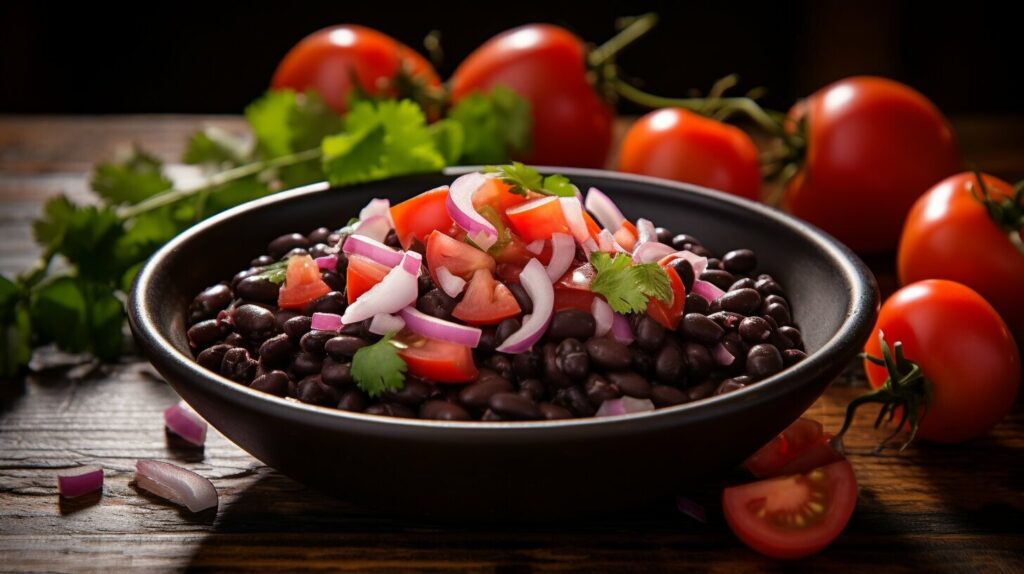
By including black beans in your diet, you can nourish your body and support your brain health at the same time.
Incorporating Black Beans into Your Diet
Now that you know about the health benefits of black beans and their nutritional value, it’s time to incorporate them into your diet. Here are some tips on how to enjoy black beans in your meals:
- Add cooked black beans to salads for a boost of protein and fiber.
- Mash black beans with avocado, garlic, and lime juice for a healthy dip.
- Use black beans as a meat alternative in tacos, burritos, and quesadillas.
- Top baked sweet potatoes with black beans and salsa for a tasty and nutritious meal.
- Make a black bean soup or chili for a comforting and filling meal.
- Blend black beans with spices, breadcrumbs, and egg to make flavorful and healthy veggie burgers.
Remember to rinse canned black beans thoroughly before using to reduce sodium content. You can also soak and cook dried black beans for better flavor and texture.
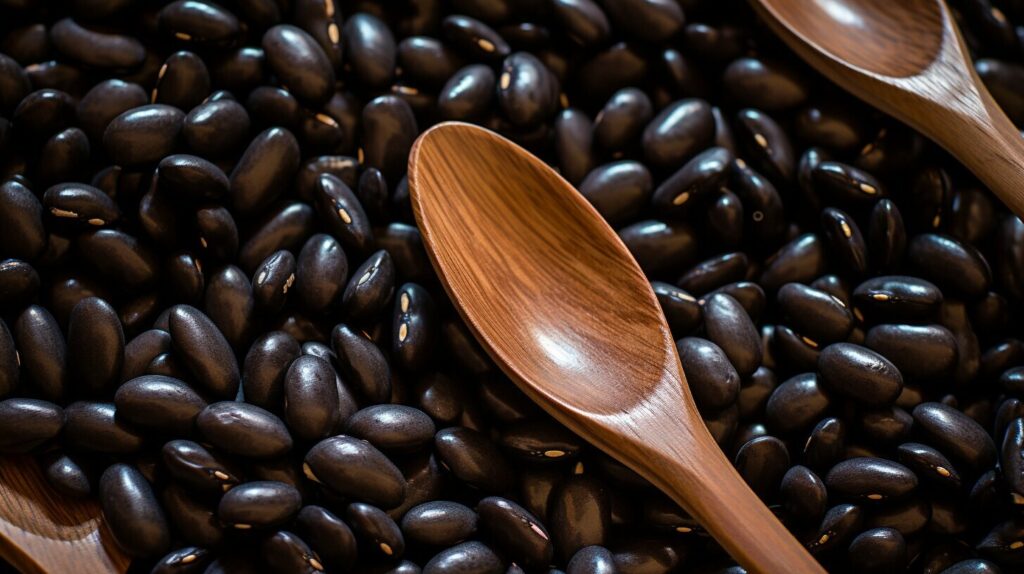
Incorporating black beans into your diet can provide numerous health benefits, from promoting heart health to enhancing brain function. So, go ahead and enjoy this nutrient-packed superfood in your meals!
Conclusion
You now know that black beans are a nutrient-packed superfood that can offer a wide range of health benefits. By incorporating black beans into your diet, you can manage your weight, support heart health, improve digestive health, regulate blood sugar levels, strengthen your bones, boost your energy levels, improve your immune system function, and nourish your brain.
There are many different ways to incorporate black beans into your diet, such as adding them to soups, salads, or chili, using them as a base for veggie burgers or dips, or simply enjoying them as a side dish. Be creative and experiment with different recipes to find the ones you like best.
Final Thoughts
Remember to always consult with a healthcare professional before making changes to your diet, especially if you have any health conditions or concerns.
With their incredible health benefits and versatility in the kitchen, black beans are truly a superfood you don’t want to miss out on. So, why not start enjoying the benefits of black beans today?
FAQ
Q: What are the health benefits of black beans?
A: Black beans offer numerous health benefits, including promoting heart health, aiding in weight loss, supporting digestive health, managing diabetes, strengthening bone health, boosting energy levels, enhancing the immune system, and nourishing brain health.
Q: What is the nutritional composition of black beans?
A: Black beans are a nutritional powerhouse, rich in protein, fiber, vitamins, and minerals. They are low in fat and cholesterol-free, making them a healthy addition to your diet.
Q: How can black beans aid in weight loss?
A: Black beans are an excellent source of plant-based protein, which can help you feel fuller for longer and support weight loss efforts. They also have a low glycemic index, aiding in blood sugar management.
Q: How do black beans contribute to heart health?
A: Consuming black beans can help lower cholesterol levels and reduce the risk of heart disease. Their high fiber content and beneficial nutrients support overall heart health.
Q: How can black beans promote digestive health?
A: Black beans are rich in fiber, which supports a healthy digestive system and prevents constipation. They can help regulate bowel movements and promote overall digestive health.
Q: Are black beans suitable for individuals with diabetes?
A: Yes, black beans have a low glycemic index and can help regulate blood sugar levels. They are a nutritious food choice for individuals with diabetes and can improve insulin sensitivity.
Q: How do black beans strengthen bone health?
A: Black beans contain essential minerals like calcium, magnesium, and phosphorus, which are crucial for maintaining strong and healthy bones. Incorporating black beans into your diet can support bone health.
Q: Can black beans boost energy levels?
A: Yes, the complex carbohydrates and iron present in black beans provide a sustainable source of energy. Including black beans in your meals can help maintain steady energy levels throughout the day.
Q: Do black beans enhance the immune system?
A: Black beans are rich in antioxidants and phytonutrients, which can strengthen the immune system and reduce the risk of infections. Regular consumption of black beans supports overall immune health.
Q: Do black beans support brain health?
A: Yes, black beans contain nutrients like folate and antioxidants, which are beneficial for brain health and cognitive function. Incorporating black beans into your diet can nourish your brain.
Q: How can I incorporate black beans into my diet?
A: There are many ways to enjoy black beans! You can add them to soups, salads, stews, or use them as a filling for tacos and burritos. They can also be mashed and used as a spread or blended into dips like hummus.




